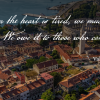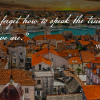
Published: May 15, 1999
View the Original Newsletter: Iskra-34.pdf
About This Issue
Iskra No. 34 explores the growing divide and dialogue between Croatia and its diaspora as post-war politics evolve. With elections looming, Valentina Krčmar’s Motrišta reflects deeply on the Croatian diaspora’s sense of alienation — a call to remember the sacrifices made by Croats abroad and their right to participate in shaping the homeland’s future. Alongside these reflections, the issue includes news from Croatia and Canada, cultural notes, sports coverage, health advice, and community events celebrating Croatian identity and resilience.
Motrišta: “Croatia and Its Diaspora”
Valentina Krčmar opens with a question that resonates through the issue: How much does Croatia truly know about its diaspora’s role during the war? She reminds readers that while Croatia might have survived without the diaspora, it would have been far more difficult. From financial aid to advocacy and humanitarian efforts, Croats abroad were instrumental — yet many now feel dismissed.
She laments that the diaspora, once united by purpose, has grown discouraged, withdrawing from Croatia’s political and social life because they feel unheard and unappreciated. Krčmar challenges this resignation, comparing Croatia to a child raised under communism that must be taught responsibility, integrity, and fairness.
“We must not turn away when things become difficult. The homeland and diaspora built Croatia together — and both must continue to nurture it.”
Krčmar also questions who truly represents the diaspora in the Croatian Parliament. Many emigrants, she argues, feel disconnected from their so-called representatives, who do not reflect their experiences or values. Her appeal is both firm and hopeful — that dialogue between homeland and diaspora must be rebuilt on respect, transparency, and shared love for Croatia.
From the Editor’s Desk
Valentina lightens the tone briefly with a personal anecdote about receiving cyclamen flowers from Zagreb — only to be reminded that picking wildflowers in Croatia has been outlawed. She uses this as a metaphor for bureaucracy and contradiction in post-war Croatia, noting humorously that “there are laws against picking flowers, yet markets are full of bouquets.”
She then reflects on international justice finally catching up to Serbia’s war crimes. Quoting NATO spokesman Jamie Shea and former British Prime Minister Margaret Thatcher, she writes that “justice has begun” — and that perhaps, after years of indifference, the world finally understands what Croats endured in Vukovar and elsewhere.
News from Croatia
Prepared by Valentina Krčmar, the news section provides political, social, and economic updates from spring 1999:
-
New Croatian Peasant People’s Party Founded — Promoting Christian-democratic and social values, led by Joško Kovač.
-
Erdut Exhumations Begin — Recovery of victims of the 1991 aggression continues under Croatia’s Ministry for Veterans.
-
Government Estimates NATO Conflict Costs — Prime Minister Zlatko Mateša reports economic losses exceeding one billion kuna due to the regional conflict.
-
Finance Minister Borislav Škegro on Budget Cuts — Announces a rebalanced budget with reduced revenues and tightened spending.
-
PLIVA Wins “Golden Share of 1998” — The pharmaceutical company is named Croatia’s top corporate performer.
-
Tensions in Bosnia — Reports from Žepče and central Bosnia describe political gridlock between Bosniak and Croat leaders.
-
Montenegro’s Defiance — President Milo Đukanović asserts that Montenegro will pursue reform “with or without Belgrade.”
-
Yugoslavia Requests Electricity from Croatia — Zagreb refuses, aligning with NATO’s embargo policy.
Community and Diaspora
Croatian Business Roundtable with Maja Freundlich
Renowned journalist Maja Freundlich meets Croatian-Canadian entrepreneurs to discuss investment opportunities in Croatia. Organized by Krešimir Mayer and Croata International, the event inspires hope for stronger economic cooperation between homeland and diaspora.
Tribute to Gojko Šušak
The Toronto branch of HDZ Canada holds a memorial mass marking one year since the death of Croatia’s defense minister. Rev. Ivica Kecerin and community leaders Vesna Geoheli and Josip Pavičić honor his legacy as “a man of faith, courage, and patriotism.”
Education and Community Programs
-
Croatian Language at the University of Toronto — Courses offered at both the Erindale and St. George campuses through the Department of Slavic Languages.
-
English for Newcomers — The Mennonite New Life Centre continues to offer free English classes and childcare for immigrants.
-
Croatian Statehood Day Celebrations — Festivities planned in Toronto and Mississauga for May 29–30, 1999, featuring live music, speeches, and community gatherings.
Culture and Lifestyle
The issue celebrates Croatian arts and daily life:
-
Poetry by Drago Gervais — “Tri Nonice” humorously captures village gossip and tradition.
-
Seasonal Tips — Gardening and fishing advice for May; folk recipes such as elderflower syrup.
-
Humor Corner — A lighthearted “fish story” joke and dialect poem “Spi moj dečec” by Zvonko Špišić add warmth and levity.
Health
A full-page article by Dr. Darko Desaty explains the health benefits of dietary fiber, discussing its role in preventing heart disease, diabetes, and colon cancer. A companion piece reports on Ontario’s new $30 million colorectal cancer prevention program — showing how Croatian-Canadians stay informed on public health developments both at home and abroad.
Sports
The sports pages critique the struggling Croatia Zagreb football club, frustrated by poor performances and lack of team cohesion. Captain Robert Prosinečki voices disappointment, questioning the players’ motivation: “Do we really want the championship?”
Closing Thought
Iskra No. 34 bridges continents — a conversation between a homeland still finding its democratic footing and a diaspora determined not to be forgotten. Valentina Krčmar’s voice urges honesty, patience, and persistence: Croatia and its children abroad must continue to grow together — not apart.




